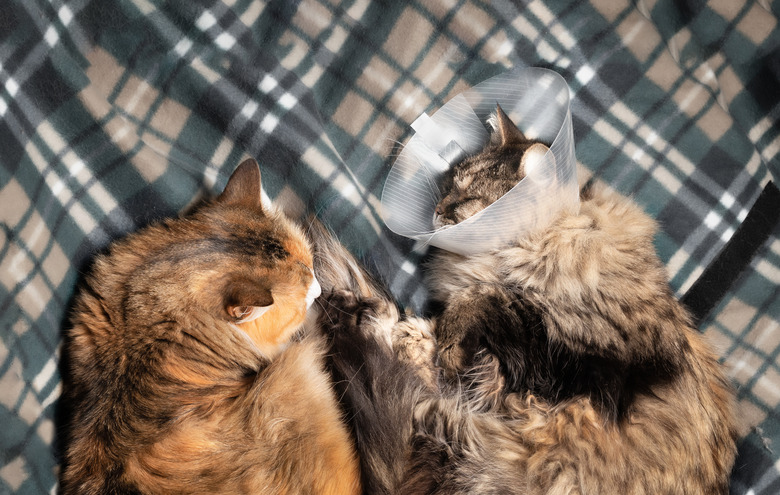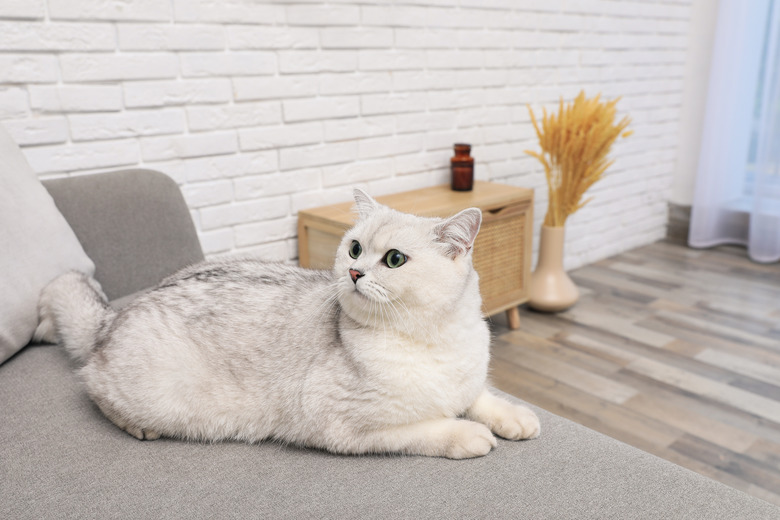Signs & Symptoms Of Cat Food Poisoning
You may be familiar with food poisoning, the nasty sickness that starts after ingesting something containing harmful bacteria. But what about our furry feline friends? They can get cat food poisoning. Quickly assess your cat for signs and symptoms of illness. Early detection can be the difference between life and death for your feline companion.
What causes cat food poisoning?
What causes cat food poisoning?
Like human food poisoning, cat food poisoning occurs when harmful bacteria make their way into your cat's food. Often, the food is raw or spoiled, though occasionally, bacteria can contaminate food during production.
Cats are prone to the following foodborne illnesses:
- Salmonella
- Botulism
- Listeriosis
Raw meat, decomposing food, and unwashed or unpasteurized food, including canned products, can contain these unhealthy bacteria. It's important to note that kittens and older senior cats are especially prone to poisoning due to their weakened immune systems.
Cats can also be poisoned by the food they eat, not due to bacteria but because they are intolerant or allergic to the substance. For example, certain additives can cause excessive amounts of specific nutrients that can trigger gastrointestinal upset. Additionally, certain plants like rhubarb are toxic to felines, as are a handful of household products.
It's quite rare for cats to get sick due to food poisoning. Most of the time, the symptoms are due to another illness or disease. Whatever the cause, it's important to recognize when they aren't feeling well so your cat can get the vat care they need.
The first stages of cat food poisoning
The first stages of cat food poisoning
In most cases, if your cat has eaten something bad, you'll start to see symptoms appear within a few hours. However, they may persist for days to weeks.
You may notice some diarrhea and vomiting as the first signs of food poisoning. These symptoms are typically sudden and signal that a trip to the vet is necessary. Cats with vomiting and diarrhea can also suffer from dehydration, weight loss, and fever. Dehydration can cause pale gums and persistent thirst, so you may notice your cat drinking more water than usual.
Along with gastrointestinal upset, some cats exhibit lethargy and loss of appetite. They may not be interested in playing or eating. An extremely lethargic cat should be taken to the vet as soon as possible, as it could be a side effect of renal failure.
Alternatively, your pet may seem restless and agitated if they have food poisoning. They may exhibit distress by pacing, using vocal calls, or generally acting irritated.
Advanced signs of cat food poisoning
Advanced signs of cat food poisoning
Food poisoning symptoms can last for days to weeks. However, a lack of treatment can cause the symptoms to become more severe and life-threatening.
Some felines display weakness, drooling, and inability to urinate. These symptoms can be a sign of severe kidney damage. In addition, heavy salivation, tremors, and seizures may also signal liver damage. However, the most detrimental effects of food poisoning occur in the kidneys.
Botulism, in particular, can cause concerning symptoms. Increased heart rate, paralysis, difficulty breathing, and cardiac arrest are possible. These symptoms necessitate a call or trip to an emergency veterinarian. You can also contact the ASPCA Animal Poison Control Center Phone Number, a 24/7 hotline for animal-related emergencies.
These symptoms can appear within hours or days. Different bacteria, toxins, and foods may cause varying symptoms. If you suspect your cat has been poisoned, taking quick action can make all the difference in the outcome of your pet.
Cat illnesses can look like food poisoning
Cat illnesses can look like food poisoning
Many illnesses can mimic cat food poisoning. The only way to tell what is making your pet sick is to take your cat to the veterinarian. They'll be able to assess your cat's symptoms, run lab work on their blood or feces if necessary, make a diagnosis, and start treatment. They will likely want to review your cat's dietary history in depth to rule out possible sources of infection.
Do not hesitate if you think something is wrong with your cat. It may not be food poisoning but symptoms of another disease or infection. However, while some illnesses like Salmonella get better with time, others, such as botulism, can be fatal if they're not quickly given antitoxin.
The best way to treat cat poisoning is to prevent it entirely. You should always check the quality of your cat's food to ensure it is not spoiled or under recall. Keep hazardous foods, plants, and household products out of reach.

